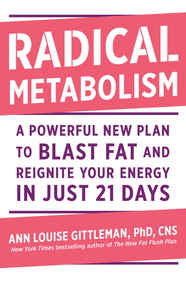Ask an Expert
NOVEMBER TOPIC: Help! My Body Isn't Working the Way it Used To!
|
Ann Louise Gittleman, Ph.D., C.N.S.
Nutritional Visionary & Health Pioneer |
OUR EXPERT:
Ann Louise Gittleman, Ph.D., C.N.S., is a New York Times bestselling author of over 30 books on diet, detox, the environment and women’s health. Beloved by many, she is regarded as a nutritional visionary and health pioneer who has fearlessly stood on the front lines of holistic and integrative medicine. A Columbia University graduate, Ann Louise has been recognized as one of the Top Ten Nutritionists in the country by Self magazine and has received the American Medical Writers Association award for excellence and the Cancer Control Society Humanitarian Award. Ann Louise has appeared on 20/20, Dr. Phil, The View, Good Morning America and other nationally broadcast shows. Her work has been featured in a myriad of national publications, including Time, Newsweek, O,The Oprah Magazine, Good Housekeeping, The Huffington Post, The New York Times and many others. |
"What can I do to minimize hot flashes naturally? They are horrible. It seems that reducing my sugar intake helps, or am I imagining things? Are there other dietary changes I can make to help alleviate hot flashes?" ~ Emily (CA)
Hot flashes can be minimized ‘naturally’ with the use of 2 to 4 tablespoons of toasted flax seeds and a topical progesterone cream to balance fluctuating hormones. Balancing blood sugar with sufficient protein and fats (think avocado, nuts, seeds, olive oil) will also help to quell symptoms as will the elimination of spicy foods and caffeine-rich beverages like coffee and regular tea. Dandelion root tea and hibiscus herbal tea are great swaps for high caffeine sips.
"I’m forgetful and scattered these days. I walk into a room, and then I don’t remember what it was that sent me there. Is this perimenopausal brain fog, or should I be worried?" ~ Kim (FL)
A foggy brain is not unusual during perimenopause. Including foods high in essential fatty acids, such as chia seeds, hemp hearts, and walnuts, will help nourish the brain. Reducing ALL types of sugars - even fruit juice - may be helpful in curbing possible sugar-fueled Candida yeast overgrowth, which can also be linked to shifting hormones.
"Is there a natural lube you would recommend to ease pain during intercourse? This is the worst part of menopause that I’m experiencing." ~ Anonymous
Look for products containing aloe vera, calendula, and vitamin E. These natural lubricants are found in health food stores.
"I never used to get really bad cramps during menstruation, but now they are terrible. My monthly cycle is also accompanied by really heavy bleeding which is also a change. Any tips to alleviate these symptoms?" ~ Chris (NY)
Adding more B6 (100 mg), GLA (360 mg)* and magnesium during menstruation will help cramps tremendously. Heavy bleeding can be a sign of estrogen dominance and progesterone deficit, so more zinc rich foods like pumpkin seeds and eggs might also help as zinc is a precursor to progesterone.
*Editor’s note: GLA is an Omega-6 fatty acid which is available in many vegetable-based oils, including evening primrose oil, borage seed oil, and black currant seed oil.
Hot flashes can be minimized ‘naturally’ with the use of 2 to 4 tablespoons of toasted flax seeds and a topical progesterone cream to balance fluctuating hormones. Balancing blood sugar with sufficient protein and fats (think avocado, nuts, seeds, olive oil) will also help to quell symptoms as will the elimination of spicy foods and caffeine-rich beverages like coffee and regular tea. Dandelion root tea and hibiscus herbal tea are great swaps for high caffeine sips.
"I’m forgetful and scattered these days. I walk into a room, and then I don’t remember what it was that sent me there. Is this perimenopausal brain fog, or should I be worried?" ~ Kim (FL)
A foggy brain is not unusual during perimenopause. Including foods high in essential fatty acids, such as chia seeds, hemp hearts, and walnuts, will help nourish the brain. Reducing ALL types of sugars - even fruit juice - may be helpful in curbing possible sugar-fueled Candida yeast overgrowth, which can also be linked to shifting hormones.
"Is there a natural lube you would recommend to ease pain during intercourse? This is the worst part of menopause that I’m experiencing." ~ Anonymous
Look for products containing aloe vera, calendula, and vitamin E. These natural lubricants are found in health food stores.
"I never used to get really bad cramps during menstruation, but now they are terrible. My monthly cycle is also accompanied by really heavy bleeding which is also a change. Any tips to alleviate these symptoms?" ~ Chris (NY)
Adding more B6 (100 mg), GLA (360 mg)* and magnesium during menstruation will help cramps tremendously. Heavy bleeding can be a sign of estrogen dominance and progesterone deficit, so more zinc rich foods like pumpkin seeds and eggs might also help as zinc is a precursor to progesterone.
*Editor’s note: GLA is an Omega-6 fatty acid which is available in many vegetable-based oils, including evening primrose oil, borage seed oil, and black currant seed oil.




